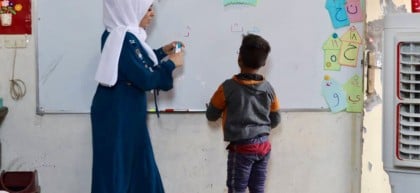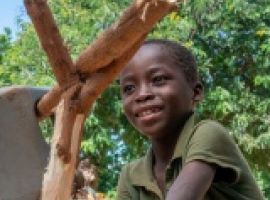
Read our 2022 annual report

Knowledge Hub
RAIN project: empowering communities to tackle malnutrition
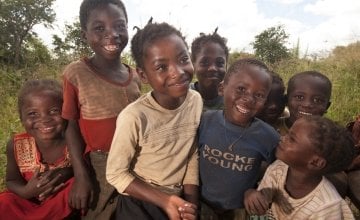
Malnutrition in a baby’s first 1,000 days can blight their health for life. Our Realigning Agriculture to Improve Nutrition (RAIN) project in Zambia worked to develop a new model for reducing malnutrition during this vital time.
We speak to Richard Mwape, Concern programme coordinator, to explore the project's impacts, surprises and lessons learned.
Babies who experience chronic malnutrition during the precious 1,000-day window from conception to their second birthday, will suffer from irreversible stunting. Stunting is a form of growth failure that impacts a child’s brain development, IQ and immune systems for life.
Our recently-completed Realigning Agriculture to Improve Nutrition (RAIN) project worked across sectors for five years to tackle this problem in Zambia, where almost half of all children are stunted.
Working with Mumbwa Child Development Agency (MCDA) and the International Food Policy Research Institute (IFPRI) with the support of Irish Aid and the Kerry Group, RAIN focused on Mumbwa district, in Zambia’s Central Province.
Concern programme coordinator, Richard Mwape, oversaw the management of the project as it worked with communities to weave together agriculture, nutrition, health and women’s empowerment activities to ultimately tackle malnutrition. A crucial aspect of the project was closely monitoring and recording the process and the impacts so that the model can be honed and used in other areas and at scale.
Female farmers lead the way
Discussing the main activities that the RAIN team introduced across sectors, Richard underlines the strong emphasis in the project on community leadership and empowerment.
He notes, “In terms of agriculture, the RAIN team trained female Smallholder Model Farmers to train and lead local women’s groups in best practice for gardens, integrated pest management, crop diversification and rotations.
"We also passed on small livestock to the groups through these model farmers and worked with government extension workers to support diversified crop production.”
Community learning on health & nutrition
With regards to health and nutrition, an essential dimension was the training of Community Health Volunteers to support local groups in learning about nutrition. Richard adds, “This included supporting cooking demonstrations for groups, training mothers, grandmothers and other care givers in complementary feeding and exclusive breast feeding, rehabilitating boreholes, supporting infant and young child feeding (IYCF) practices and encouraging the growth of micronutrient-rich crops.”
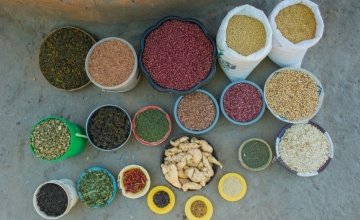
However, it wasn’t all about training sessions. The team also brought the RAIN messages to life in the communities, supporting drama performances to reinforce messages on women’s empowerment, health and nutrition, and agriculture.
And at local government level, RAIN worked with relevant ministries to better coordinate nutrition programmes in the district. Ultimately this led to the formation of the District Nutrition Coordinating Committee (DNCC), one of the project’s important legacies. Currently, 13 other districts have taken their lead from RAIN and formed DNCCs of their own.
Outcomes and work in progress
The final project report, released earlier this month, makes it clear that RAIN brought several important positive and fundamental changes to the communities of Mumbwa district.
Richard notes, “The project had proven positive impacts on agricultural production, household food security (as measured by household dietary diversity) and on women’s social and economic empowerment, as well as women’s empowerment in agriculture.
"Additionally, project measures had a potentially protective effect on child wasting."
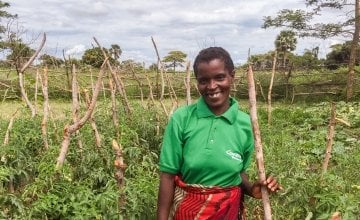
Stunting was actually reduced significantly in both the control area and the project area, but this could not be attributed to the project.
The team consider that possibly the project didn’t make a bigger impact because of the timeframe and because it didn’t address all the underlying causes of chronic malnutrition.
Richard explains, “We were a bit surprised by these results. In addition, knowledge on infant and young child feeding increased but this did actually not translate into practice.”
The team is committed to working harder to transform knowledge into improved behaviours as they move forward.
The RAIN project is still in motion for the next year as the team works to further strengthen the project groups to ensure the sustainability.
They will also be sharing the project results nationally and internationally. Based on the knowledge and lessons learned from the first RAIN project, a similar project is now underway – RAIN+ places a stronger focus on linking women to markets and on involving men in care practices.
The 1,000-day window of hope
The focus of RAIN and RAIN+ remains the same – seizing the opportunity to improve a child’s life during the first two years of life.
Richard concludes, “It’s the window of hope – once a child is stunted, it can never be reversed. And the effect of stunting increases as a child grows, affecting cognitive development and therefore resulting in a lower performance throughout their school life.”
